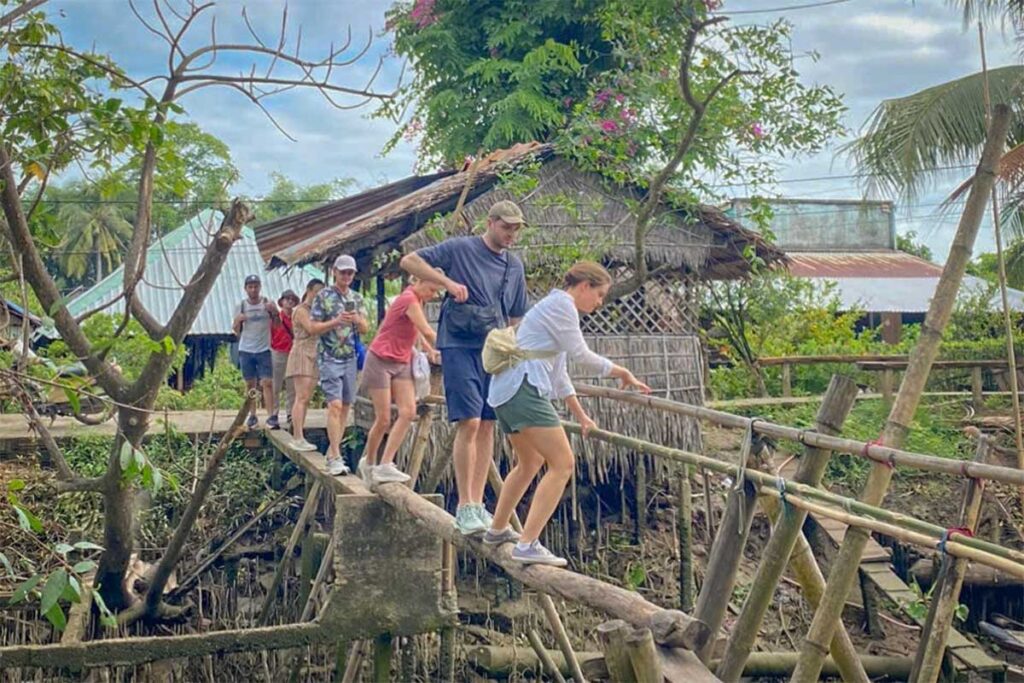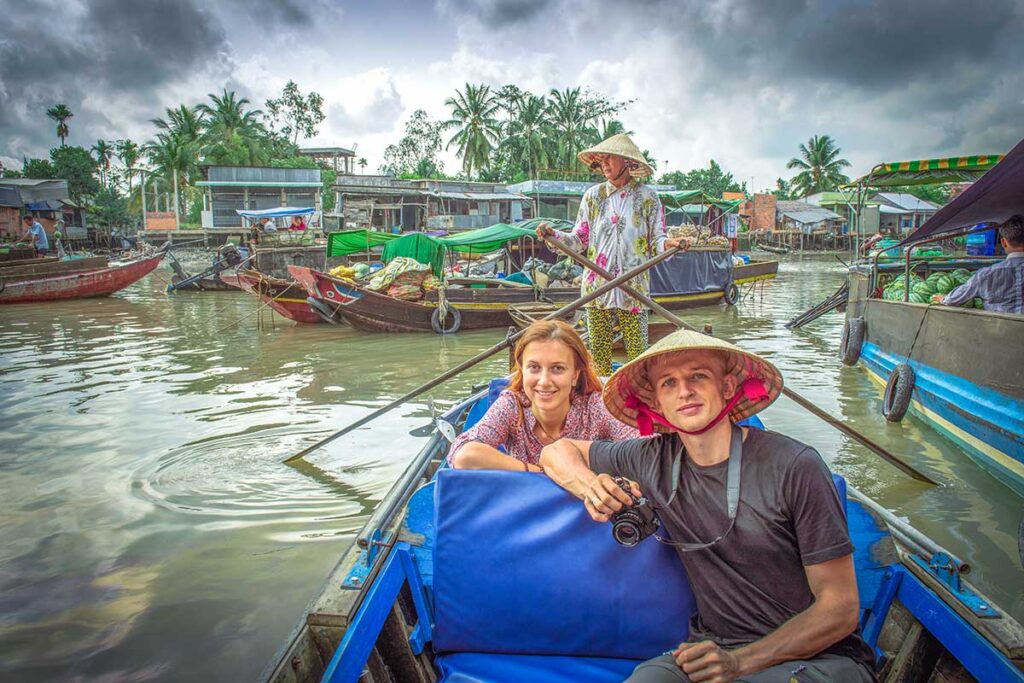What is Con Son Islet?
Location and scenery
Con Son Islet lies in the Hau River, just 5–10 minutes by boat from Cô Bắc Wharf in Bình Thủy District, Can Tho. It covers only a few dozen hectares but feels like a world apart, with breezy canals, orchards heavy with tropical fruit, and a handful of floating houses tied to the banks. The pace is rural and quiet, with dirt paths and shaded gardens forming the backdrop for visits.
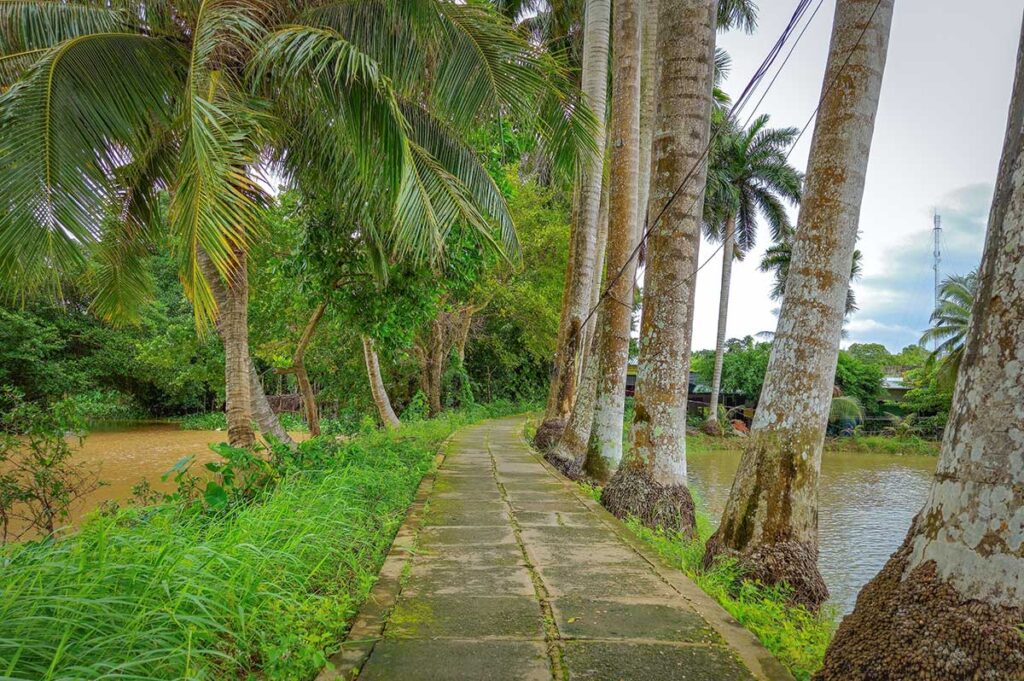
Local life on the island (before tourism)
Before visitors ever arrived, life here revolved around small-scale farming and fishing. Fewer than 100 households live on the islet, tending pomelo, rambutan, star apple, and jackfruit trees or running fish rafts anchored in the river.
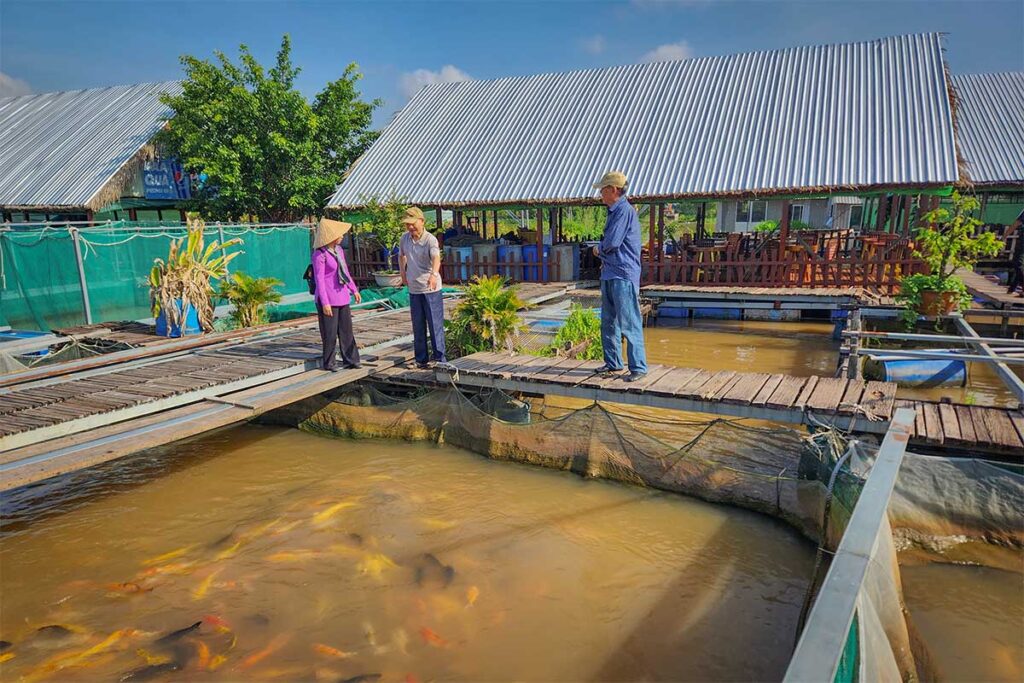
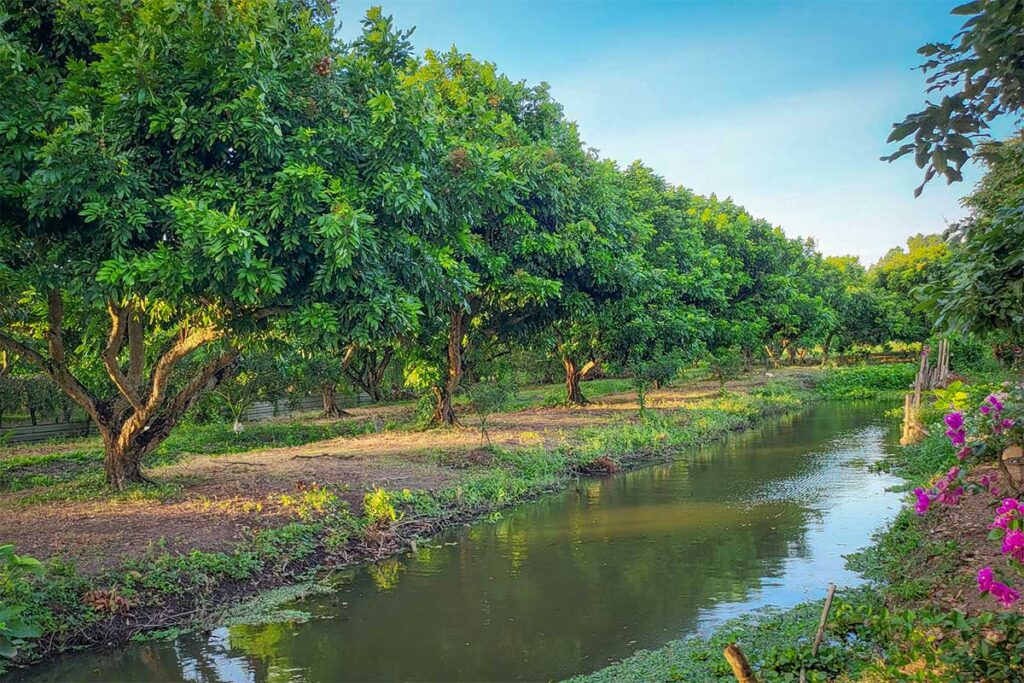
Older generations also worked with “sơn” (lacquer trees), whose sap was used in traditional ship painting and lacquer art, though this trade has long since faded.
Starting and promoting community tourism
The idea of welcoming visitors began around 2014–2015, when a group of households experimented with letting outsiders join their daily work. From there, community tourism grew into a model where each family offers something different—fruit picking, fish feeding, cake making, or homestays. The Can Tho authorities later stepped in with infrastructure improvements and coordination to help keep services consistent and attractive.
Authentic life or a curated experience?
Con Son strikes a balance between authenticity and curation. The orchards, fish farms, and cooking sessions are part of real livelihoods, but they’re presented in organized “stations” for visitors. Compared to the mass-tourism four-island tours near My Tho, Con Son feels quieter and more personal, especially on weekdays. At the same time, the structured format means not every moment feels spontaneous, and the quality can vary depending on the household and season.
Highlights of visiting Con Son Islet
1. Fish raft visits (Mr. Bay Bon & neighbors)
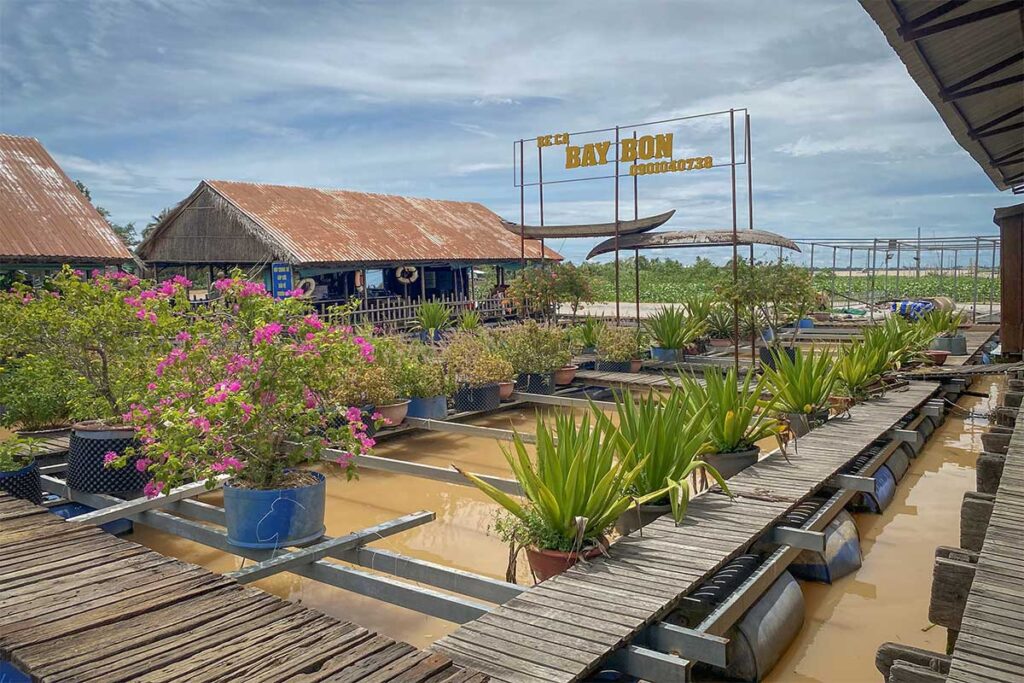
One of the most popular stops is the floating fish farms moored along the river, especially the large setup run by Mr. Bay Bon. Here you can see pangasius, catfish, and even colorful koi swimming in netted enclosures. The visit usually includes a short explanation of aquaculture methods and a chance to toss handfuls of feed, watching the water churn as the fish surge to the surface.
2. “Flying” snakehead fish show
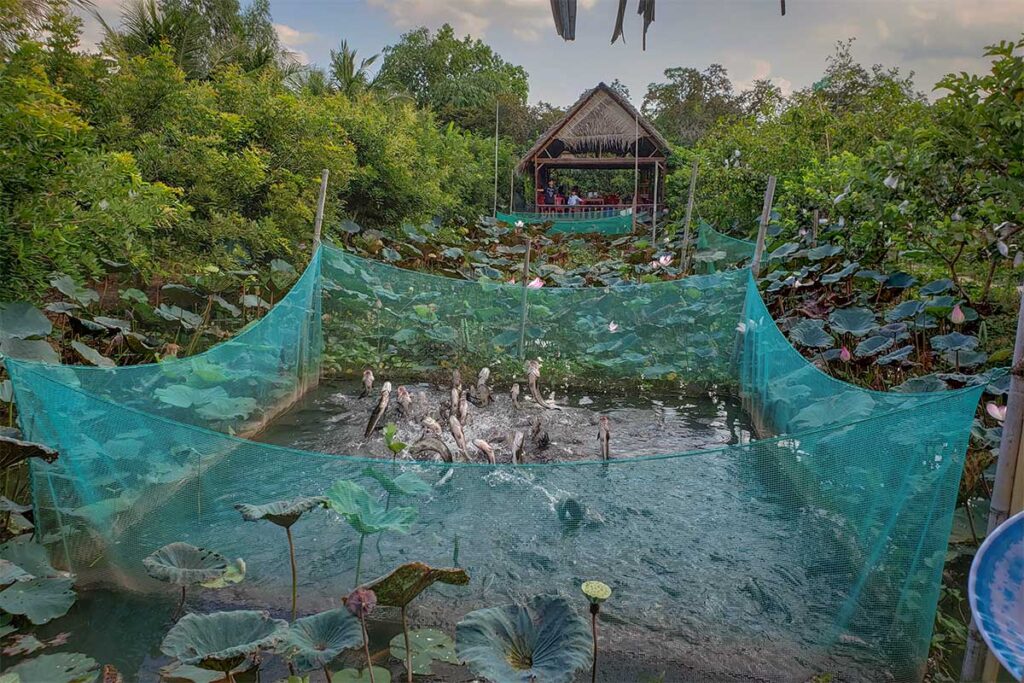
A quirky attraction unique to Con Son is the “flying snakehead” demonstration. The fish are trained to leap from the water to snatch food tossed above them, sometimes clearing 30–40 cm in the air.
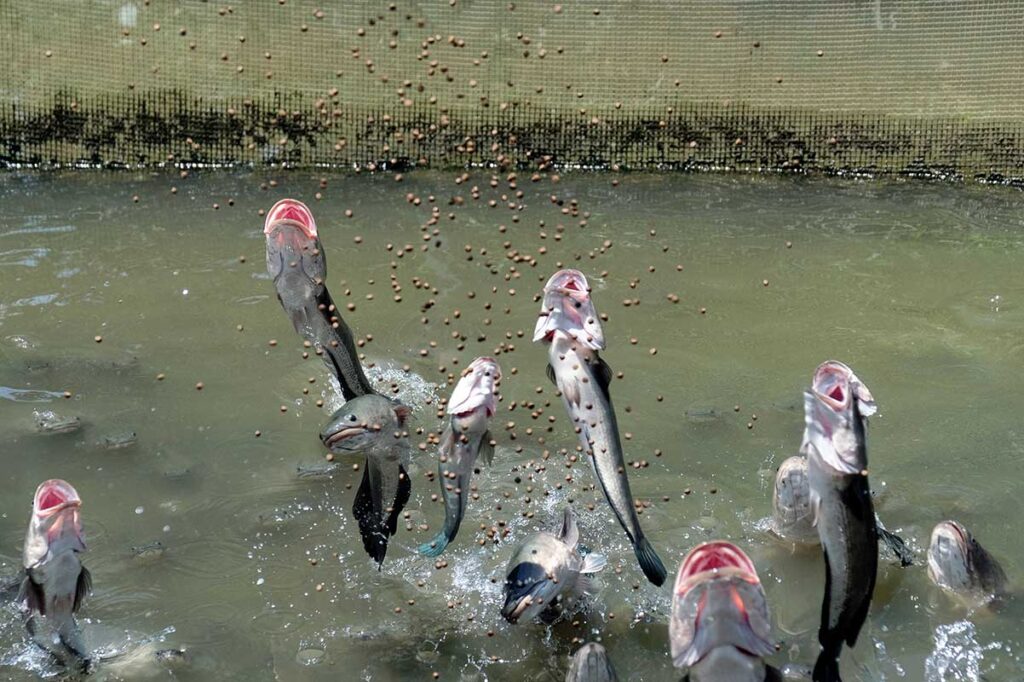
It’s a quick performance—fun to watch but not everyone’s favorite, especially for those concerned about animal welfare. Keep in mind that the fish won’t perform endlessly; once they’ve eaten their fill, the show winds down.
3. Traditional southern cake making with local families
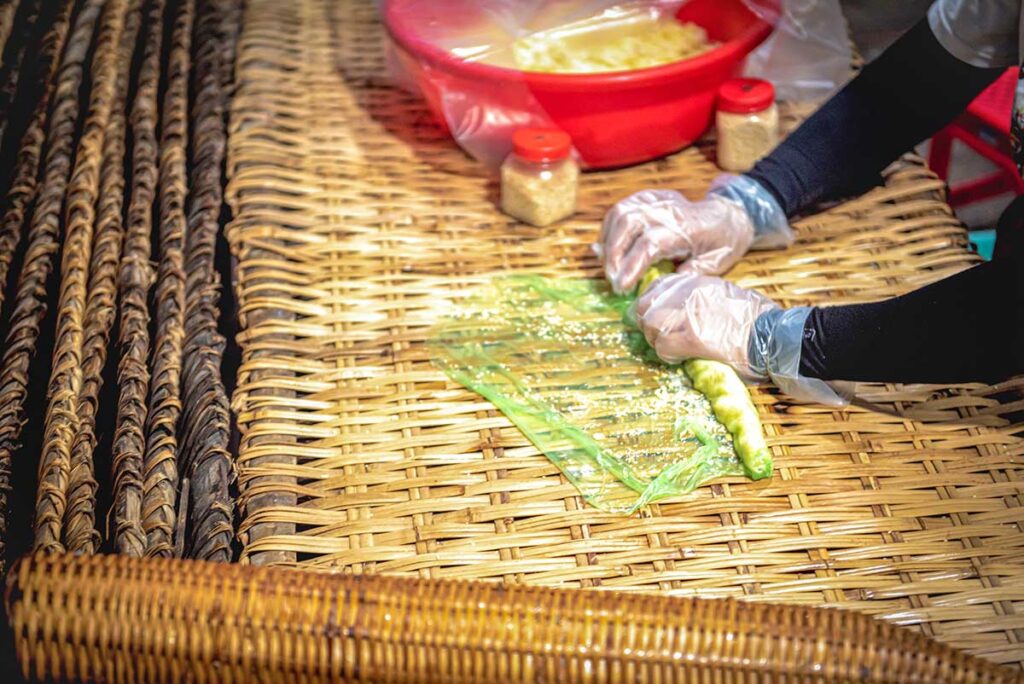
Several households invite guests into their kitchens to learn how to make rustic southern cakes such as bánh xèo (crispy pancake), bánh khọt (mini pancakes), and bánh lá mít (jackfruit leaf cake). You’ll grind rice, stir coconut milk, and cook over a fire before enjoying your creations. These sessions are best arranged in advance and work well for families or small groups who want a hands-on activity.
4. Orchard walks and seasonal fruit tasting (Apr–Jul peak)
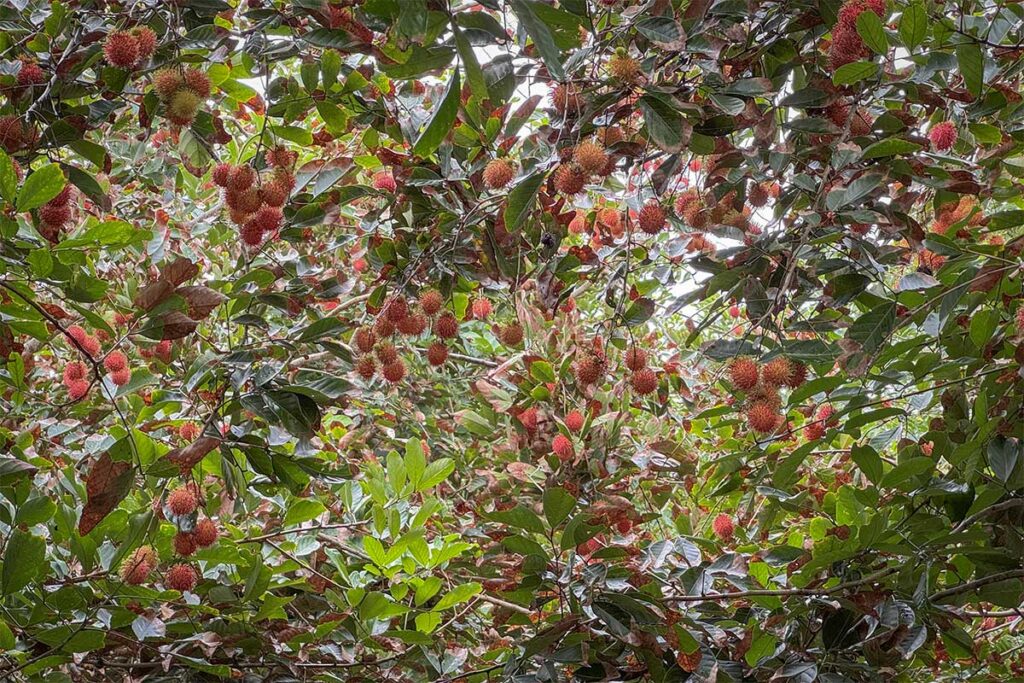
Con Son’s fertile soil supports lush orchards of rambutan, longan, pomelo, star apple, and jackfruit. Visitors can stroll through shaded groves, taste fruit straight from the trees, and buy some to take away at fair prices. The peak season from April to July is when gardens are heaviest with ripe fruit, but there’s usually something growing year-round.
5. Community “flying meal” concept
Lunch on Con Son often follows a community model: each participating household prepares a single dish, and together these are combined into one shared meal for visitors. This spreads the income fairly among families while giving travelers a broad sampling of home-style Mekong cooking. It’s informal, hearty, and a little unusual compared to eating in one household.
6. River & canal life up close
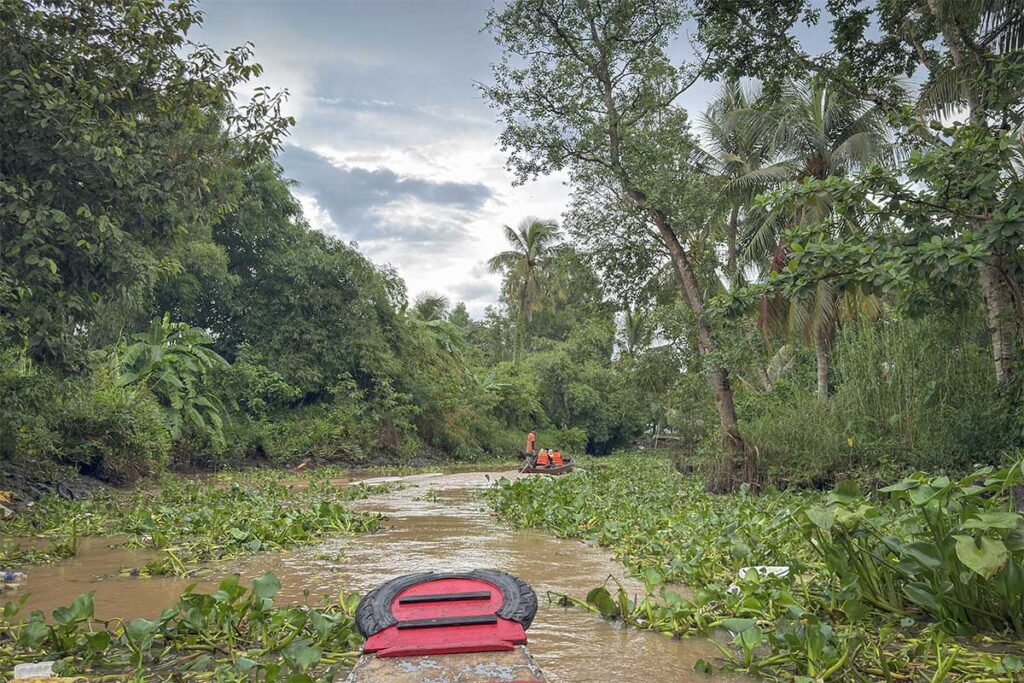
Beyond orchards and rafts, you can take a short paddle in a three-leaf boat or wander along the narrow concrete paths that crisscross the island. These small moments—watching chickens scratch in the dirt, children cycle to school, or boats pass under palm fronds—offer a feel for daily life on the river.
7. Rural novelties & quick stops
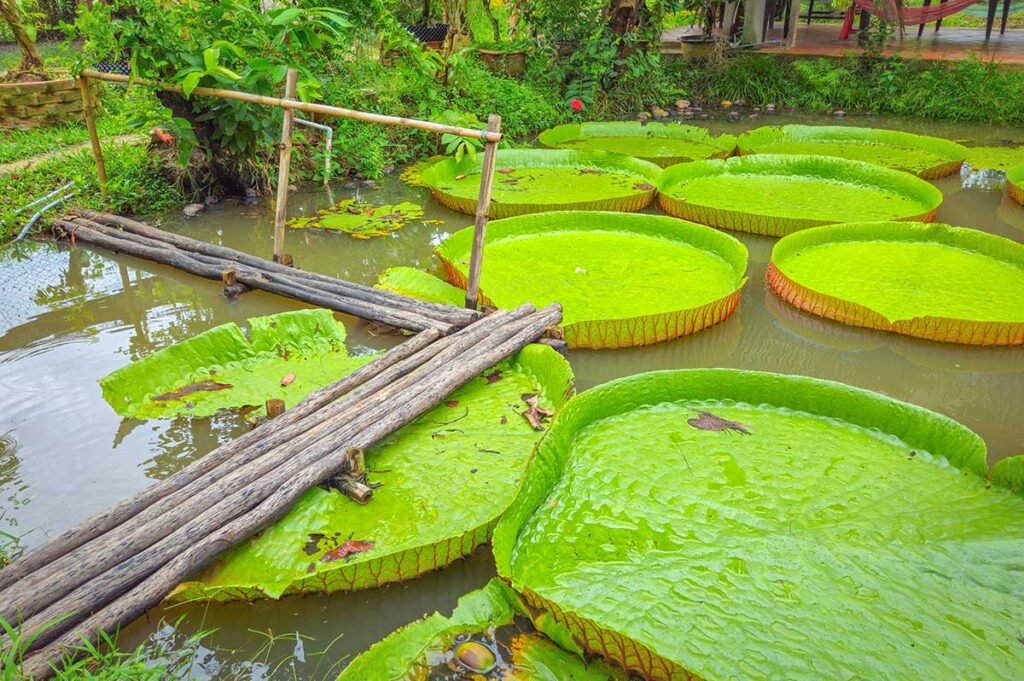
Depending on the household, you might also see a demonstration of puffed rice (nổ cốm), sip fresh coconut water in a garden, dip your feet in a fish “spa” pond, or take photos beside lotus ponds and rustic bamboo “monkey bridges.” These extras are simple but add variety to the visit.
8. Music & culture (when arranged)
Groups can sometimes enjoy đờn ca tài tử, the traditional folk music of southern Vietnam, performed by local amateurs. It’s not a guaranteed feature every day, but when available, it gives a cultural depth to the otherwise activity-focused visit.
9. Simple homestays (limited capacity)
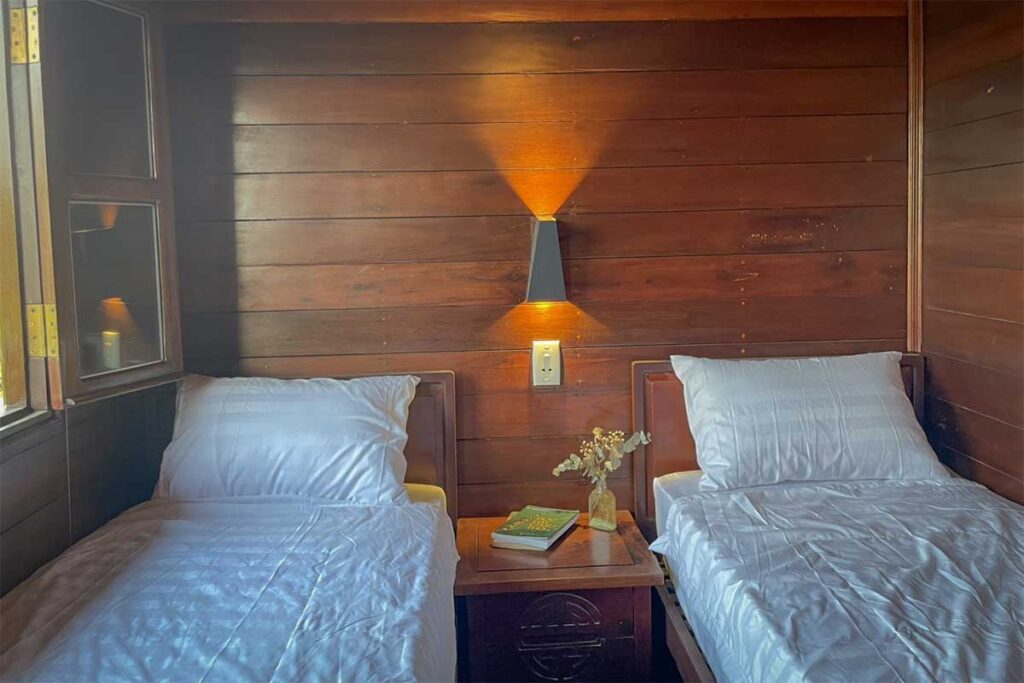
A handful of households offer overnight stays in basic conditions—think hammocks, fan-cooled rooms, and garden meals rather than modern hotels. These homestays suit travelers who want to linger, but they must be booked well in advance due to the very limited number of hosts.
Location and Getting there
Can Tho as a base
Con Son Islet is part of Bình Thủy District, just a short hop from the center of Can Tho City. From most hotels in town, you can reach the wharf in 20–30 minutes by car or motorbike, making it easy to combine with morning visits to Cai Rang Floating Market or an afternoon stop at Binh Thuy Ancient House. Because the islet itself is small, it’s best enjoyed as part of a fuller Can Tho itinerary rather than a standalone trip.
Going by tour
The easiest way to visit is through a guided tour arranged in Can Tho. A local guide takes care of boat transfers, household coordination, and activity timing, which can otherwise be confusing to manage alone.
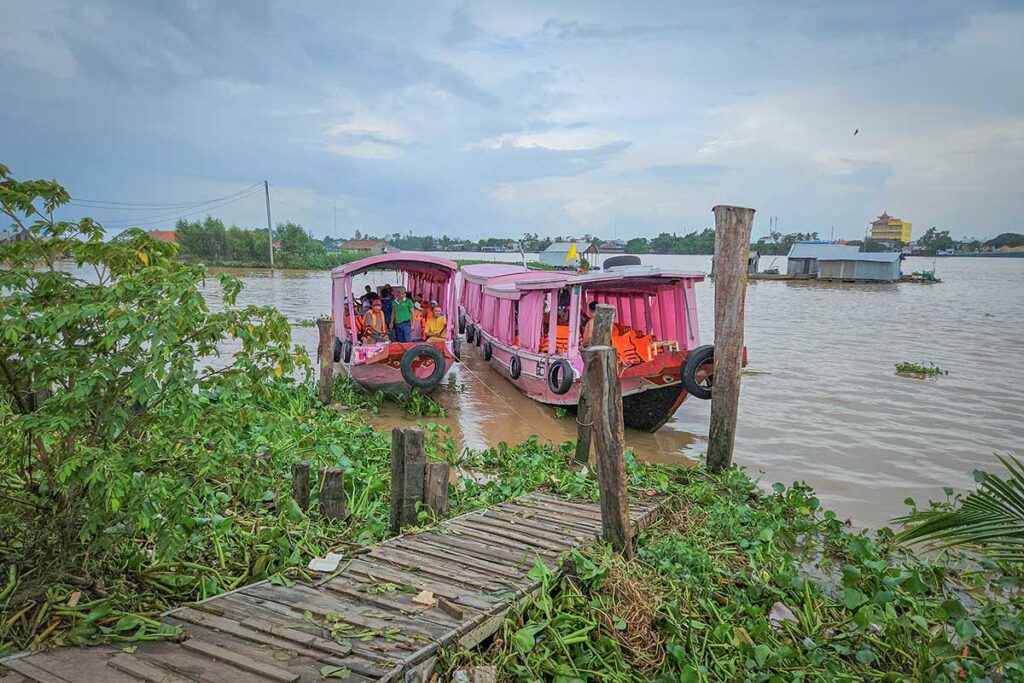
English-speaking guides make the experience smoother, helping bridge the language gap with island families. Tours usually last half a day and can include lunch, with prices varying depending on how many activities (fish rafts, cake class, orchards) are bundled in.
Traveling independent
Independent travel is possible but comes with caveats. To start, make your way to Cô Bắc Wharf, where small boats ferry visitors across the river in just 5–10 minutes. On some days, however, boat operators and the island’s tourism association insist that visitors join a guided or packaged program rather than buying a simple ferry ticket.
There are a few ways around this: arrive early in the day before groups form, politely ask for ferry-only passage, or better yet, pre-contact a household or the association to confirm arrangements and costs. Always bring enough cash in small denominations, and expect that English will be very limited—having a translation app ready will make things easier.
Practical visiting information & Tips
Best time of year & crowd patterns
The most rewarding period is during fruit season, roughly April to July, when orchards are heavy with rambutan, longan, and pomelo. Weekends and holidays can feel busier with domestic visitors, while weekdays are noticeably quieter and more relaxed. Whatever the season, mornings are cooler and more comfortable for walking around.
How long to spend
Plan for 2–4 hours if you just want to see the highlights like fish rafts, cake making, and an orchard stop. A half-day with lunch is ideal, while a full day makes sense if you want to combine Con Son with other Can Tho sights.
Costs & what’s included
Expect a small fee for the ferry across, plus package or activity-based charges once on the island. The local association often sells combo tickets that include a guide, raft visits, and garden access. Some activities—like the snakehead show, cake classes, or community lunch—carry separate fees. Cash in small denominations is preferred, as card payments are not available.
What to bring
Bring sun protection (hat, sunscreen, light clothing), a refillable water bottle, insect repellent, and small bills for entrance fees and snacks. Tissues and hand gel are handy since toilets are basic. Wear comfortable shoes or sandals you don’t mind getting wet.
Language & expectations
Most households have little or no English, so communication is basic but friendly. Expect simple, homespun service rather than polished tourism infrastructure. A translation app can help with ordering food or clarifying activity details.
Access & safety
Paths are narrow and sometimes uneven, so take care if visiting with children or elderly relatives. Lifejackets are generally provided on boats, but check before boarding. Facilities are basic, so set expectations accordingly.
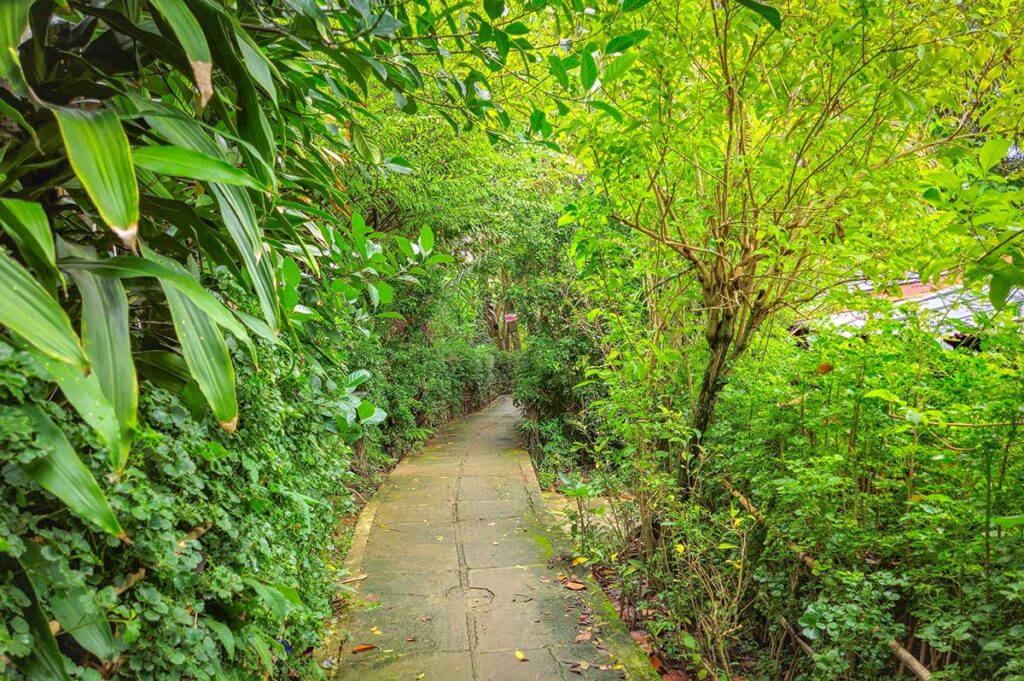
Responsible travel
Take any rubbish back with you and avoid leaving plastics on the island. Be mindful around animals, and ask before photographing local people. Stick to paths, as erosion and water levels are ongoing issues for the community.
Booking & coordination tips
Call or message a household in advance—especially if you want to join a cake-making class, eat lunch, or stay overnight. Confirm costs, inclusions, and activity timings to avoid surprises. If you show up without notice, availability and service levels can vary.
Weather notes
Con Son is hot and humid year-round, with sudden downpours in the rainy season (May–October). Pack a light rain jacket or poncho if visiting then. Even in dry months, bring plenty of water to stay hydrated.
Nearby places to combine (half-day or full-day plans)
Con Son itself takes about 2–4 hours. To turn it into a fuller day, add one stop on the way to Cô Bắc Wharf plus one around Can Tho (a bit farther but doable the same day).
On the way to the wharf (truly nearby):
Binh Thuy Ancient House (closest, easy add-on). If you have a little extra time, Nam Nha Pagoda or Binh Thuy Temple are workable detours in the same district.
Around Can Tho (not next door, but fits the same day with transport):
Cai Rang Floating Market (early morning, then Con Son late morning/lunch),
Muoi Cuong Cacao Farm + Truc Lam Phuong Nam Zen Monastery (often combined; they sit near each other),
Bang Lang Stork Garden (longer countryside detour; best late afternoon).
For more ideas to round out your plan, see our full list of things to do in Can Tho.
Is Con Son Islet worth visiting?
Who will love it: Con Son Islet works best for families, travelers curious about rural culture, photographers interested in everyday Mekong life, and anyone who enjoys hands-on activities like cooking or fruit picking. It also suits those who prefer a slower pace compared to Can Tho’s busier floating markets.
Limitations to consider: The experience can feel curated at times, with activities presented in a staged format. Attractions like the snakehead fish show or fish “spa” may raise animal-welfare concerns, though you can simply skip them. Quality isn’t always consistent between households, and some visitors report being required to join a guide or association package instead of exploring independently. Facilities are basic, and it’s not the right choice if you’re after sweeping scenery or polished infrastructure.
Verdict: Con Son Islet is worthwhile as a half-day add-on to a Can Tho itinerary, especially if you value authentic-but-organized encounters with local life. Go with realistic expectations, choose the activities that appeal to you, and you’ll likely come away with a memorable slice of the Mekong Delta.
